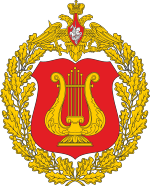| Special Exemplary Military Band of the Guard of Honor of Russia | |
|---|---|
| Военный образцовый оркестр Почётного караула России | |
 Emblem | |
| Active | November 29, 1956 – present |
| Country | |
| Branch | |
| Type | Military Band |
| Role | Ceremonial services |
| Part of | |
| Garrison/HQ | Moscow |
| Commanders | |
| Current commander | Major Pavel Gernets |
The Special Military Exemplary Band of the Honor Guard (Russian: Военный образцовый оркестр Почётного караула, ВООПК) is a special military unit that performs military music for the guard of honor of the Russian Armed Forces that greets foreign government delegations, as well as provide musical accompaniment for national events. It is a branch of the Military Band Service of the Armed Forces of Russia. The band was created in the fall of 1956 by order of the Soviet Government, having performed in the welcoming ceremonies of hundreds heads of state and has played its music at many memorials in the country.[1]
The band forms part of the 3rd Honor Guard Battalion, 154th Preobrazhensky Independent Commandant's Regiment.
Directors of the band
[edit]
- Colonel Georgiy Nikolaev (1956–1968)
- Lieutenant Colonel Nikolai Zubarevich (1968–1972)
- Colonel Boris Dyldin (1972–1988)
- Colonel Anatoliy Prihodchenko (1989–1993)
- Colonel Sergey Gorev (1993–1998)
- Colonel Eduard Nikolaev (1998–2003)
- Colonel Mikhail Titov (2003–2007)
- Lieutenant Colonel Igor Pahomov (2008–2009)
- Major Konstantin Petrovich (2009–2015)
- Major Pavel Gernets (2015–present)
Brief history
[edit]
In one of the detachments of the Moscow Cheka, a special musical platoon was created to provide cultural activities for troops. The band was officially organized in the spring of 1940 at the Moscow Garrison. Three years later, the group was given the title of Exemplary Band of the 236th Regiment of the 36th NKVD Division. Since July 1951, the band has worked with ceremonial services in the Soviet Army, including the Dzerzhinsky 1st Motorized Rifle Division of the Ministry of Internal Affairs. On November 29, 1956, the Council of Ministers of the USSR ordered the band begin its existence as the Exemplary Military Band of the Guard of Honor.[2][3] Since 1999, the band has been known and operated under its current name. It is best known for playing at the welcoming ceremony of Yuri Gagarin, the 1980 Summer Olympics, the Yalta and Potsdam Conferences and the visit of Kim Il Sung to Vladivostok.[4] It serves as a musical unit during the wreath laying ceremony at the Tomb of the Unknown Soldier in Moscow's Alexander Garden.[5][6]
Gallery
[edit]-
The band at Vnukovo International Airport.
-
A flutist of the band in the summer uniform.
-
The band marching at the Tomb of the Unknown Soldier (Moscow) in Alexander Garden.
-
The band in their winter overcoats.
-
The band during a 2013 concert.
-
The head of the band with Venezuelan President Hugo Chavez.
Common ceremonial Music
[edit]| Title | Composer |
|---|---|
| Moscow Fanfare | A. Golovin |
| In Defense of the Motherland | Viktor Runov |
| Ballad of a Soldier | Vasily Solovyov-Sedoi |
| Slow march "25 years of Red Army" | Semeon Tchernetsky |
| Adagio | Valery Khalilov |
| Solemn Triumphal March | Valery Khalilov |
| Moscow's Salute | Semeon Tchernetsky |
| March of the Preobrazhensky Regiment | |
| Slow March of the Red Army | Semeon Tchernetsky |
| Slow march "Victory" | Yuri Griboedov |
| Song of the Soviet Army | Alexander Aleksandrov |
Links
[edit]References
[edit]- ^ "The Exemplary band of the Honor Guard". www.kremlin-military-tattoo.ru. Retrieved 2017-04-15.
- ^ "Under the Red Star - Honor Guards".
- ^ Распоряжения (выписки из распоряжений) Совета Министров СССР за 1949, 1953—1970 годы, хранящиеся в ГАРФ.
- ^ "Оркестр почетного караула репетирует встречу лидера КНДР Ким Чен Ына в центре Владивостока".
- ^ "В московском саду имени Н.Э. Баумана дал концерт Военный образцовый оркестр Почетного караула : Министерство обороны Российской Федерации".
- ^ "Военный оркестр Почетного караула выступил в саду имени Баумана".






